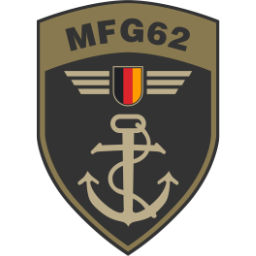MFG62 Operational Doctrine (Draft)
Purpose and Identity
MFG62 is a coordinated strike-focused virtual maritime aviation squadron.
We operate as a fighter-bomber unit, prioritizing mission objectives, teamwork, survivability, and disciplined execution. We reject “join-frag-die” gameplay and instead simulate professional, deliberate air operations.
Our identity is defined by:
- Teamplay over individual heroism
- Mission success over kill counts
- Survivability over risk-taking
- Prepared, coordinated operations over ad-hoc sorties
Core Principles
Virtual Life Matters
Aircraft and pilot lives are treated as valuable assets.
- Reckless behavior is discouraged.
- Risk is taken only when aligned with mission objectives.
- A loss rate above 25% per deployment constitutes major mission failure.
Mission-Focused Tasking
MFG62 operates primarily as a fighter-bomber / strike group.
We do not consider air superiority or CAP as our primary task.
- If fighter cover is used, it is coordinated with supporting units, not self-provided.
- Strike packages are planned with realistic ingress/egress, timing, and loadouts.
Team-Oriented Conduct
Every member contributes to mission success:
- Share situational awareness
- Follow package commander instructions
- Prioritize survival of the group
- Maintain formation, timing, and radio etiquette
- Avoid lone-wolf behavior unless ordered
Prepared Operations
Operations are pre-planned, never random.
- Briefings define: objectives, routes, threats, comms, roles, rules of engagement, abort criteria
- Debriefings analyze performance, not blame individuals
Integrity and Professionalism
Members are expected to:
- Respect the mission, teammates, and immersion
- Communicate clearly
- Maintain an attitude of continuous improvement
Organizational Structure
Roles
Each mission assigns operational roles such as:
- Package Lead – overall command
- Strike Lead – target attack coordination
- Navigation Lead – flight route & timing expertise
- Defensive Lead – threat awareness and countermeasures
- Element Leads/Wingmen – pairs operating in mutual support
- Mission Planner – prepares the initial flight plan and briefing
Wingman Philosophy
Wingmen support their lead at all times.
Leads are responsible for their element’s survival and success.
- “Stay with your lead” is a core expectation unless otherwise ordered.
Operational Guidelines
Pre-Flight
- Review mission briefing thoroughly
- Confirm loadout is appropriate to mission and doctrine
- Conduct radio checks and formation checks
- Ensure everyone understands abort criteria
In-Flight
- Maintain formation discipline
- Communicate briefly and clearly
- Execute planned attack profiles accurately
- Avoid unnecessary engagements
- Abort strikes if survival is compromised beyond acceptable thresholds
Rules of Engagement
- Engage enemy fighters only if necessary for mission protection
- Avoid prolonged dogfights; disengage if possible
- Ground targets are prioritized by strike lead
- Do not deviate for opportunistic kills
Recovery and Post-Flight
- Follow planned egress routes
- Land safely; rejoin procedures apply
- Participate in debrief
- Evaluate the mission with emphasis on safety, teamwork, and procedure, not kills
Metrics of Success
Primary Metrics
- Loss rate (target: <25%)
- Completion of strike objectives
- Adherence to mission plan
- Team cohesion and communication
Secondary Metrics
- Precision of ordnance delivery
- Efficiency of ingress/egress
- Situational awareness quality
- Effectiveness of discipline (altitude, speed, formation)
Kills are not considered a primary success metric.

